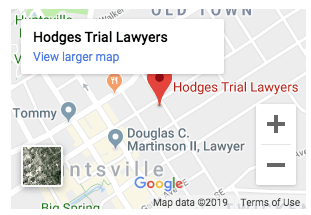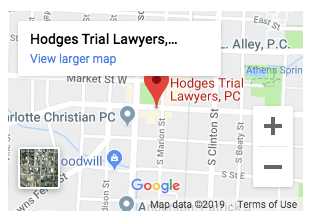If you’ve been hurt in a car accident and your injuries have led to medical bills and time away from work, you might be interested in pursuing compensation. This can be a whole new world for most victims, which means learning a completely new vocabulary. “Maximum medical improvement,” often shortened to MMI, is one of the terms you’ll likely become familiar with.
Learn more about MMI and how it may affect your car accident claim. To discuss your accident in greater detail, call Hodges Trial Lawyers at 256-826-4129.
Defining Maximum Medical Improvement
Maximum medical improvement is a healthcare term that describes a specific point in an injured person’s healing. A patient has reached MMI when their injuries have stabilized and are not expected to improve with further medical care or treatment.
In many cases, maximum medical improvement is the same as a full recovery—obviously, once a patient has made a full recovery from their injuries, no further improvement is expected or possible. However, for those with severe or complex injuries, a patient may never have a complete recovery. In these cases, MMI may happen when all treatment options have been fully explored and either tried or ruled out.
Note that reaching maximum medical improvement does not necessarily mean that the patient will stop all medical treatment and care. With many injuries, ongoing care is required to maintain the individual’s progress and quality of life. But once MMI has been achieved, the focus shifts to maintaining progress and keeping patients comfortable with their limitations.
What Maximum Medical Improvement Means for Your Car Accident Claim
Maximum medical improvement plays an incredibly important role in your car accident claim. It can determine the true value of your claim. Once you have reached MMI, your providers can more accurately predict the type and amount of care you will need going forward.
This may include physical therapy, pain management, and occupational therapy. You will also be able to calculate the full cost of your care up to this point, which is a huge benefit when you are trying to negotiate a settlement.
As you may expect, the insurance company doesn’t want you to wait until you reach MMI to accept a settlement. They know that injuries are often far more complicated than expected, and waiting until MMI often means that they have to pay more than they want. Their goal is to push you into accepting an offer early, and it can be hard to resist that pressure.
Know this—if you do accept a settlement offer before reaching MMI and later find out that your injury is more expensive than you thought, you do not have any other options. You can’t go back to the liable party and renegotiate your settlement or provide them with proof of your additional expenses. You sign that right away when you accept the settlement.
Factors Affecting MMI
A wide range of factors affect MMI. It’s not reasonable to say that all victims should reach MMI within a certain timeframe or after a certain amount of treatment. Every injury is different and so is every victim. Some of the factors that may be relevant to you include:
- The type of injury you’ve sustained
- How serious the injury is
- Your age and overall health prior to the accident
- How well you follow the doctor’s treatment plan and commit to your treatments
- Pre-existing injuries or medical conditions that may affect your current injury
As you see, some of these factors are within your control—in particular, how much you follow your doctor’s treatment plan and attend all scheduled appointments. It is crucial to follow all recommended treatments and do any recommended exercises. If you don’t follow your treatment plan, the insurance company can use that against you when it comes to offering a settlement.
Get the Assistance You Deserve—Contact Hodges Trial Lawyers Now Wherever you are in your healing process, the team at Hodges Trial Lawyers is here to help you pursue full and fair compensation. Get started right now by scheduling your free consultation. Just call us at 256-826-4129 or send us a message online



